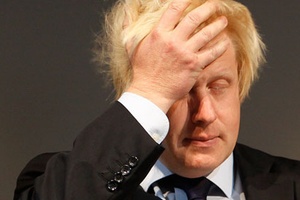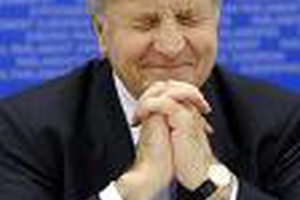-
30 mars 2016
Protect or innovate? Of Marseille Soap and other traditional products

How to protect non-food products which are emblematic of a geographical area? The European Commission is working on the extension of both protected designation of origin (PDO) and protected geographical indication (PGI) system for non-agricultural products. What are the challenges? Is such a regulation adapted? lire la suite
-
11 mars 2016
Boris Johnson, tea bags and the complexity of law

Boris Johnson, in his plea for Brexit, develops the familiar theme of excess of niggling and stupid standards coming from Brussels. But the proliferation of legal texts is not to be blamed on the European Union. It reflects the tensions between conflicting aspirations of a complex society, the demand for ever greater security and the refusal of any hazard. lire la suite
-
19 juin 2015
The case for a European data policy

A consistent set of European standards could prove to be a lever for framing a digital industrial policy. In a legal framework where individuals come under high protection, the winners will be the enterprises who inspire enough confidence to obtain the users’ consent to access and use their personal data. Trust, says Rachel Botsman, is the currency of the 21st Century. Maybe. But data is the commodity of the future, and those who can combine trust and valuable data can lead the race. It has just started. lire la suite
-
12 avril 2011
The trouble with the European Stability Mechanism

The meeting of the European Council on 24-25 March focused on shoring up the battered Eurozone infrastructure through the European Stability Mechanism. This column argues that the mechanism is seriously flawed. It says it is unlikely to withstand the shock of a severe financial crisis and may even spread the damage to high-debt countries, while leaving the Eurozone in the grip of paralysing vetoes. (in French; English version available on VoxEU) lire la suite
-
18 février 2011
The Fog of Currency War

One way to expose the economic mumbo-jumbo that is applied to the Chinese exchange rate by otherwise respectable economists is to look at it from the perspective of Germany and international trade. China-bashers, who from stuttering economies lecture those who have presided over the biggest economic miracle that has occurred without thieving foreign lands or labour, like to focus on current account imbalances. A better measure of competitiveness would be the trade account. The current account includeshot money inflows that come under the exchange control restrictions and have ballooned since the China-bashers created the belief that the renimbi is a one-way appreciation bet. Chinas annual trade surplus with the world was $184.5bn at the end of 2010 or 3.6% of GDP. More than ten significant economies have a larger trade surplus as a percent of GDP than China. Natural-resource-poor Germany is the most interesting analogy and it has the largest 12-month trade surplus in dollar terms in the world: $205.4bn or 6.0% of GDP. (in French) lire la suite
-
4 février 2011
Energy: Nabucco’s comeback

Since its launching in 2002, the Nabucco pipeline project has had several lives. Many times it was given as death, but it finally managed to rise from its own ashes. Even though the Russian-Ukrainian gas crisis in 2006 transformed Nabucco into a top priority European project, in the last few years it advanced a little but backed up a lot, resulting in barely concealed mockery. This pattern is true and depicts Nabucco’s situation before the economic crisis. The latter, with its negative effects, brought a breath of fresh air for the European project and its proponents have used it rather wisely. The latest developments in Azerbaijan and Turkmenistan are encouraging with regard to the equation of supply sources. It seems that Nabucco is back. lire la suite
-
23 décembre 2010
The European debt crisis: worrisome delusion

In the December 17 issue of the Financial Times, Lorenzo Bini-Smaghi has produced a brilliant, if slightly patronizing, defense of the no-default strategy currently pursued by the euro area authorities. His arguments are that public debts are widely-held instruments so that a default would harm domestic banks and domestic citizens, possibly triggering bank runs and forcing governments to take administrative measures like the Argentinean corralito, that true democracies do not do this kind of things, that it would be a “quick fix” with much worse consequences than tight fiscal policies and structural reforms. These are mostly solid arguments though it would be interesting to understand why democracies cannot default and what structural reforms have to do with fiscal discipline and, if they do, how soon their beneficial effects can be felt. (in French; an English version has been published on VoxEU) lire la suite
-
5 novembre 2010
EU: tax harmonization in sight?

Led by EU Commissioner Algirdas Šemeta, the new Tax Policy Group brings together personal representatives of EU Finance Ministers to discuss key tax policy issues. The Group aims to work on fundamental topics such as how taxation can contribute to a stronger Internal Market, to the growth and competitiveness of Europe's economy and to a "greener" economy. It will also serve as a forum for deeper discussion on priority matters, such as financial sector taxation, common consolidated corporate tax base and the new VAT Strategy. What are the prospects for tax harmonization? (in French) lire la suite
-
15 octobre 2010
The Two Rebalancing Acts

A “strong, balanced, and sustained world recovery” as demanded by the G20 is a daunting challenge for policymakers. This column argues that two rebalancing acts are required: internal rebalancing – replacing government spending with private-sector demand, and external rebalancing – addressing the global imbalances between exporting and importing countries. These two rebalancing acts, it adds, are taking too long. (French version on Telos, English version on VoxEU). lire la suite
-
29 septembre 2010
EU: new ways of the small and middle economies

A quick trip through the Czech Republic, Sweden, Slovakia and Poland offers curious impressions of economic situation. All these countries are seeing a fast economic recovery of around 4 percent this year, and the contrast could hardly be greater to the current US depressed mood. Unemployment is the main concern but bubbles are on their way. One can also wonder about the policies carried in these countries whose leaders speak a new language. lire la suite
-
16 septembre 2010
Bank regulation reform: moving, ever so slowly in Europe

Three years after the bank crisis began, two years after it exploded, the policymaking response is moving forward, but surprisingly slowly. Two important steps have just been taken, a superficial one at the European level, a more fundamental one at the international level. In the EU politicians seem unable to resist the powerful lobbying of the banking industry while Basel III has so far side-stepped the all-important issue of systemically-important financial institutions. (in French) lire la suite
-
12 septembre 2010
Taking Stock of Europe's Financial Reform

Financial regulation, more than other domains of economic policy, is open to misinterpretation. Since most economists abandoned it for a long time, it lacks solid analytical and empirical foundations. Since it affects directly the actors of the powerful financial industry, it has to bear an excessive and constant lobbying that influences the terms of the debate. And since it applies to activities often hyperspecialized and geographically concentrated, its ins and outs are rather difficult to understand for outsiders. (in French) lire la suite
-
19 juillet 2010
EU economic governance needs more democracy

May 2010 will go down in history as the beginning of greater economic solidarity in the European Union as a result of the one-two punch of the Greek loan agreed on May 3 and the massive loan guarantee mechanism of May 9-10. But what shape that union will take remains unclear. German Chancellor Merkel wants more governance by rules, to enshrine restrictive budgetary discipline and draconian punishments for violators. French President Sarkozy wants more governance by leaders, with Eurozone countries to form a kind of economic government that determines Eurozone policy on an on-going basis. Neither will work, the first because it is too rigid as well as economically problematic, the second because it is too flexible as well as politically problematic. Neither, moreover, is very democratic. lire la suite
-
16 juillet 2010
EU: let's create independent, national budget committees

The sovereign debt crisis revealed the institutional weaknesses of fiscal policies in Europe. To an institutional weakness, it must be given an institutional response. How? We propose the creation of independent, national budget committees, as well as a European committee that would evaluate, on the basis of the information provided by the national committees, the impact of national fiscal policies for the Eurozone. Comparable to the European organization of competition or financial regulation, such an architecture would preserve national sovereignty in fiscal policies while offering a European diagnosis on the economic policy. (in French) lire la suite
-
23 juin 2010
Emergency vs. Emergency

In 1980, the French public debt amounted to 20% of GDP. In 2007, before the crisis, it had risen to 65%. By 2011, it could exceed 85%. The time has come to roll the debt back. It is an urgent task to design a process that reverses the political failures of the last thirty years. But it is equally important to ensure that the weak recovery under way does not stall or, worse, that we end up with a new recession. Thus we face two seemingly incompatible emergencies. Governments seem owed by the financial markets’ “request” for stern deficit-cutting measures, but the markets seem to understand that a new recession will deepen the deficit. This article argues that there is no such incompatibility. (in French) lire la suite
-
18 juin 2010
A Downgraded Europe?

In 2007, a group presided by Felipe González was set up to write a report on “the future of Europe”, which was delivered to the European Counsel on June 17th. One understands that right now the priorities may be concentrated on finding parades to the attacks of the markets, rather than to envision the distant future of the Union. But this report is capital in more than one way. First because the relief that followed the signature of the Lisbon Treaty gave place to the question of what to do in the next twenty years. Second because the financial crisis obviously imposes to reform the European model of governance and the European policies. (in French) lire la suite
-
14 juin 2007
Tax-free extra hours worked: not such a bad idea, after all
As a candidate, Sarkozy promised to reform labour markets. His first move concerns the infamous 35 hours workweek, not really a surprise. The shorter workweek had been introduced by the socialist government of Jospin with the explicit aim of sharing work to increase employment. It followed on earlier moves under President Mitterrand in the 1980s and under President Chirac in the 1990s. That the idea was mistaken may be obvious to (non-French) economists, but it remains controversial in France because substantial subsidies, introduced when the Jospin government realized that the measure could, well, actually reduce employment, make it difficult to identify its effects. lire la suite
-
7 février 2007
Unemployement: France should follow European ways
The labour force in Britain has grown by 212 percent since 1851; over the same period, the number of jobs has grown by 212 percent. So - ignoring the business cycle - a market economy always provides more jobs, if there are more people «effectively» seeking work. The issue is how to increase the «effective» supply of labour. So let me focus mainly on the supply side of the labour market and, especially, on the problem of mobilising the unemployed in France. I will accordingly say a little about wage flexibility, which should be central to the demand side, and about skills. lire la suite
-
11 janvier 2007
Europe Needs Policies on Russia and Energy
A year ago, the European Union was at a loss when Russia cut gas supplies to Europe through Ukraine and thus to Europe. Exactly one year later, Russia cuts oil supplies to Europe through Belarus, and the EU is equally lost. Seldom haws Russia so clearly displayed its principles. It is time for the EU to adopt policies on both Russia and energy. Otherwise, the cost of Europe's disorientation may grow exponentially. -->Russia is a market economy, and even its state sector is highly commercialized. In the last few years, the Kremlin has successfully focused on boosting the price of Gazprom stocks, rendering it the third most valuable publicly traded company in the world. Part of this endeavor has been to abolish political subsidies to friendly former Soviet republics and let gas and oil prices approach market prices. Belarus was the last country to enjoy oil subsidies from Russia, and now they are gone. lire la suite
-
30 novembre 2006
A Stronger Euro Would Not Help Reforms
As currency markets start to question the soft landing scenario for the US economy and are impressed by growth prospects in Europe, the volatility of exchange rates is increasing and the euro is on the rise, both on a trade weighted basis and against the US dollar. Whether the rally will last or not is a relative issue. Assuming that the US housing market downturn remains contained and does not spread over the whole US economy, markets should be mostly sensitive to the news flow from Europe. In this regard, the latest batch of business surveys, starting with the Ifo index, was bullish for the European currency. So was the conspicuous silence of ECB's President Jean-Claude Trichet who, although repeating that Asian currencies should be more flexible, has not commented on the recent strength of the euro. lire la suite
-
Page 1 sur 2 1 2
telos
Recevez nos articles dès leur publication
fermerVous appréciez nos articles ?
Vous aimez en ce moment
-
- Les origines sociales et le QI des inventeurs 3 jan. 2018
- Les classes sociales: permanence et renouveau 2 jan. 2018
- Emmanuel Macron: Bonaparte au pont d’Arcole et en même temps Saint-Louis sous son chêne? 4 jan. 2018
- De quoi l’autoritarisme des mouvements populistes est-il le nom? 5 jan. 2018
- Brexit: être Européens pour deux 21 déc. 2017
- Le labyrinthe catalan 22 déc. 2017
